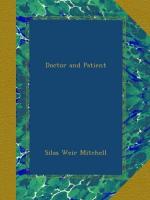[Footnote 4: Neither nerves nor nervousness are words to be found in the Bible or Shakespeare. The latter uses the word nerve at least seven times in the sense of sinewy. Nervy, which is obsolete, he employs as full of nerves, sinewy, strong. It is still heard in America, but I am sure would be classed as slang. Writers, of course, still employ nerve and nervous in the old sense, as a nervous style. Bailey’s dictionary, 1734, has nervous,—sinewy, strongly made. Robt. Whytte, Edin., in the preface to his work on certain maladies, 1765, says, “Of late these have also got the name of nervous,” and this is the earliest use of the word in the modern meaning I have found. Richardson has it in both its modern meanings, “vigorous,” or “sensitive in nerves, and consequently weak, diseased.” Hysteria is not in the Bible, and is found once in Shakespeare; as, “Hysterica passio, down,” Lear ii. 4. It was common in Sydenham’s day,—i.e., Charles II. and Cromwell’s time,—but he classified under hysteria many disorders no longer considered as of this nature.]
So much has been written on this subject by myself and others, that I should hesitate to treat it anew from a mere didactic point of view. But, perhaps, if I can bring home to the sufferer some more individualized advice, if I can speak here in a friendly and familiar way, I may be of more service than if I were to repeat, even in the fullest manner, all that is to be said or has been said of nervousness from a scientific point of view.
The two questions referred to above are these: The woman who consults you says, “I am nervous. I did not use to be. What can I do to overcome it?” Once well again, she asks you,—and the query is common enough from the thoughtful,—“What can I do to keep my girls from being nervous?”
Observe, now, that this woman has other distresses, in the way of aches and feebleness. The prominent thing in her mind, nervousness, is but one of the symptomatic results of her condition. She feels that to be the greatest evil, and that it is which she puts forward. What does she mean by nervousness, and what does it do with her which makes it so unpleasant? Remark also that this is not one of the feebler sisters who accept this ill as a natural result, and who condone for themselves the moral and social consequences as things over which they have little or no reasonable control. The person who asks this fertile question has once been well, and resents as unnatural the weaknesses and incapacities which now she feels. She wants to be helped, and will help you to help her. You have an active ally, not a passive fool who, too, desires to be made well, but can give you no potent aid. There are many kinds of fool, from the mindless fool to the fiend-fool, but for the most entire capacity to make a household wretched there is no more complete human receipt than a silly woman who is to a high degree nervous and feeble, and who craves pity and




